PERIOD III. 1884-1911
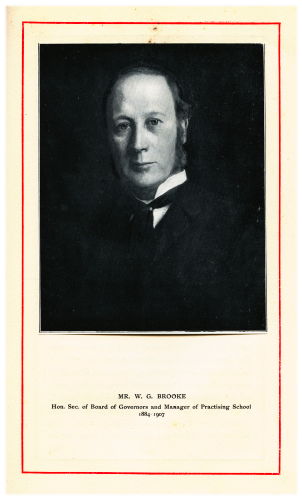
WITH no uncertain voice the General Synod of 1884 spoke. A notice in favour of a Denominational College moved by Mr. W. G. Brooke, and seconded by Mr. Bagwell --was carried without a division, and Lord Plunket welcomed the decision with the utmost thankfulness. There were, no doubt, many obstacles still to be overcome. To organise any large institution in a limited time is a heavy task; the labour is made heavier when undertaken by those whose time is already fully occupied. This, however, was no mere piece of straightforward construction. Upon an old foundation a new institution had to be raised. On the one hand it must form a continuation of the past heedful of past workers, sympathetic with past work; on the other it must present an appearance wholly new, and must have at command everything which the progress and development of education could suggest. An enterprise fraught with such difficulties as these was certain to make large demands upon the resources and capacities of those by whom it was undertaken.
Happily all this was clearly foreseen. As a preliminary step the Bishop, accompanied by the Recorder, visited a number of the English Training Colleges, and acquired a rich store of information from this source.
Next, influential public meetings were organised. Lord Plunket took the chief part at the Dublin meeting; the Recorder visited Cork. In this way the constitution of the College and its immediate needs were brought before the Church, and subscriptions flowed in so rapidly as to make it certain that there would be no failure for want of financial support.
Finally, the complicated and delicate task of internal renovation was taken up. To select from the former staff any for whom places could be found, to make generous arrangements with those whose services must be discontinued, to gather in from countless' applicants a new staff suited to the many and elaborate requirements of the situation, to undertake the complete renewal and refurnishing of the vast pile of buildings which limited resources had for years vainly endeavoured to maintain, to make the necessary arrangements for the formal opening these in bare outline were the duties which had to be discharged by the beginning of September.
Tuesday, the 9th of September, was the day fixed for the opening of the College; it was a memorable occasion. Gathered in the old school -- the scene of so many ceremonials -- a great assembly awaited the consummation of the work upon which the eyes of the whole Church had been fixed for months. The rooms themselves bore testimony to the care and taste which had been devoted to the preparation. Prominently placed were the students. In full number they had responded to the invitation to try Kildare Place once more, forming a class whose distinctions soon set the seal to the wisdom of reseeking the old-halls. There, too, was the College Staff, some of them proved by long years of service, others as yet untried, all destined to work together with singular unanimity for the achievement of signal success. There, too, also were the Committee, reaping the fruits of their long labour; and there to commend, and give thanks, were met, so far as room allowed, representatives of all that was best among the nobility, the clergy, and the laity of the Church.
Thus happily was the re-foundation of the College accomplished. The work itself was notable, and from the first was generally recognised as such. But even more noteworthy was ,the beneficial and far-reaching way in which it affected the educational activity of the Church at large. As Lord Plunket had foreseen, the breach which had lasted for fifty years was healed. N ow that teachers for Church Education Schools and for National Schools were seen in training side by side, all being engaged in the same studies, whether secular or religious, it was not possible to misread the lesson of unity thus taught. The bitterness of controversy died; a feeling of mutual help and fellowship reigned in its stead; reasonable men were once more at one.
The first serious want felt by the College after it had commenced work was the need of a regular subscription list. At its opening, donations for immediate purposes had been liberally given, but regular subscribers were not so easily obtained. To remedy the deficiency, and to place the voluntary funds on a stable basis, public meetings were organised in the principal diocesan centres. The first was held, on the invitation of Primate Knox, at Armagh, in March, 1887. The deputation from Dublin consisted of Lord Plunket (by this time Archbishop of Dublin), the Recorder of Dublin, and the writer. The meeting was eminently successful. The Diocese of Armagh has ever since been one of the chief contributors to the College. The next meeting was held in Belfast; both the Primate and the Archbishop attended and spoke. At Belfast, as at Armagh, the reception given was of the most cordial description. Further meetings were held at Londonderry, Clonmel, and Cork; they accomplished their object; no special appeals for revenue have since been required.
Side by side with the efforts on behalf of the income went the movement on behalf of the improvement of the buildings. While for the most part the rooms in use still, are those erected from 18 16 to 1825, extensive additions have been made in every part of the premises, more convenient methods of inter-communication have been introduced, and the whole appearance has been ~o completely revolutionised that no external trace remains of the original plain and unimaginative design.
With the exception that the two great school-rooms had been subdivided by permanent partitions, the buildings remained unaltered until after 1884.
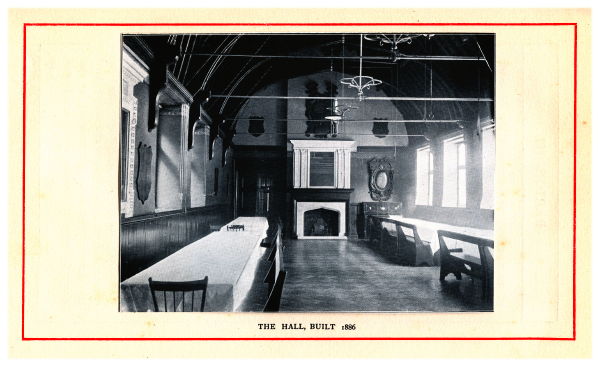
The first undertaking was the present Hall. To provide funds a bazaar was organised which received the support of the whole Church. Each diocese was represented by a stall. Lady Plunket took Dublin; Bishop Knox, at the time he was elected Primate, was active in supporting Mrs. Knox in her stall for Down. In every diocese influential workers gave ready assistance. The large profits which were made enabled the Hall and the Kitchen to be built.
Next came the new wing, which contains the Library and the Model Class Room. Part of the money was borrowed from the Board of Works; the Governors appealed successfully for the rest.
By this time the contrast between the beauty of the new, and the plainness of the old, work was so marked that further improvements became inevitable.
When the Library Wing was opened in February 1890, by the Lord Lieutenant, the Marquis of Zetland, Lord Plunket in a memorable speech compared the new work and the old to Beauty and the Beast, and he appealed at once for help to accomplish a transformation.
The required assistance came sooner than could have been anticipated. Towards the end of the Session of 1891 Mr. A. Balfour, then Chief Secretary for Ireland, introduced a Bill for placing the Denominational Colleges on an equality with the Government College in Marlborough Street, so far as their buildings were concerned. The Marlborough Street buildings had been erected at Government expense. It was proposed to refund to the Colleges the sums which had been provided for their buildings out of private sources. Scarcely was this good news known when it was announced that formidable opposition would be offered to the Bill.
As the Session was far advanced it was manifest that the situation was critical. The Archbishop accordingly determined that no effort on his part should be wanting to ensure the safety of the Bill. Accompanied by the writer he went to London in the middle of July, and spent the rest of the month drawing up parliamentary documents, attending the House, canvassing members, and interviewing the Government. The amount of hard clerical and physical work which he underwent would be almost incredible to anyone who had not witnessed it. Early and late he toiled, never missing an opportunity of gaining a point.
In the end the benefits for which the Archbishop had striven so strenuously were secured. The determined obstruction offered made it inadvisable to press the Bill as originally introduced, but an equally favourable alternative proposal was brought forward and carried, whereby a terminable series of building grants was voted to each of the existing Denominational Training Colleges.
With the help of these grants it has been possible to carry the College buildings gradually to successful completion. During Lord Plunket's managership the 'Model Schools' received a new front; cloisters and an underground passage were planned for the convenient connection of the different departments; the clock tower, the gymnasium, and a set of class rooms, were built.
When the present Archbishop succeeded to the managership in 1896, that portion of the College which adjoins Kildare Street was still untouched. It had, however, been decided that the Church Memorial to Lord Plunket should be a new front looking towards Kildare Place. The inscription upon this front was drawn up by the Archbishop, and under his guidance the whole of the remaining building operations have been conducted step by step. The last stage was reached in 19°7, when the long front in Kildare Street was completed.
It is gratifying, in connection with the buildings, to be able to place on record the substantial help which has come from former students. To their exertions and generosity are due the organ which adorns the hall, and the handsome oak bookcases and fittings in the library. To them also must be given much of the credit for the Kildare Place Memorial Front. Its inscription recalls the fact that nearly one-third of the total cost was raised by those who had once been students in the Church of Ireland Training College.
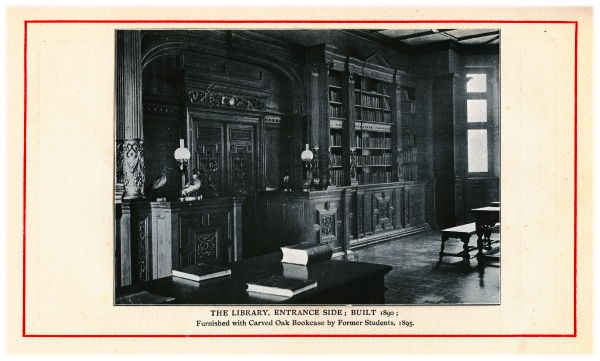
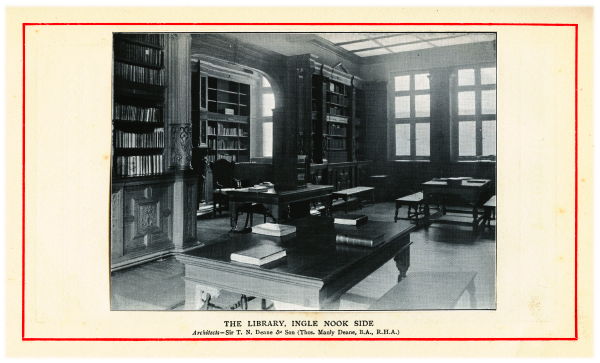
For evidence as to the position which has been accorded to Kildare Place Teachers, reference may be made to the particulars given in the alphabetical list, pp. 61-101. The appointments given in the list show that in every county and important town in Ireland schools of the first rank have been supplied from Kildare Place. Of those who have moved from teaching to other work no fewer than twenty-nine masters, have been called to the sacred ministry of the Church. The following list of those to whom the coveted distinction of a "Carlisle and Blake" Prize has been awarded by the Commissioners of National Education, shows how Kildare Place Teachers have excelled in the management of their schools:--
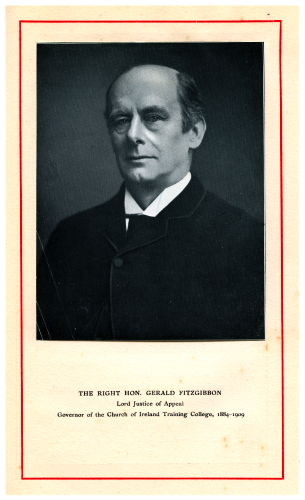
LIST OF WINNERS OF THE CARLISLE AND BLAKE PREMIUM
| 1889 | Margaret Kennedy. |
| 1890 | James M. Moore. |
| 1894 | Sarah Beckett. |
| 1898 | Martha Moore. |
| 1899 | John Upton Beckett. |
| 1900 | Joseph McCaughey. |
| 1902 | Maria Good. |
| 1904 | William N. Thornberry. |
| 1905 | Hugh Magill. |
| 1906 | John Upton Beckett. |
| " | Robert Callaghan. |
| " | William Hare. |
| " | Ernest Perry. |
| 1907 | Joseph G. J. Burrows. |
| " | Mary E. Farquharson. |
| 1908 | Robert A. Johnston. |
| " | David G. Loughrey. |
| 1909 | Robert T. Armstrong. |
| " | Mrs. Hannah Bailey. |
| " | Thomas W. Gibson. |
| " | Marshall Hill. |
| " | John McClatchie. |
| " | John Watson. |
This list of distinctions won for success in the art of teaching leads naturally to brief but grateful mention, of those who have helped by their gifts to emphasise the cultivation of correct methods, and of the other College benefactors.
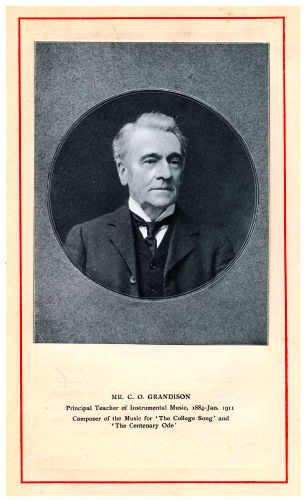
The Wilson and Suffern Gold and Silver Medals for the best Woman Teacher of the year, and the Mackay Wilson Gold and Silver Medals for the best Teacher of Holy Scripture among the men, have been founded by Mr. and Mrs. Mackay Wilson. Mrs. Brien has founded Prizes for the study of History, and for Needlework. Mr. Wood Latimer has founded an Essay Prize. It is a pleasure to know that all these Donors are with us still. Among those who have passed away special mention is due to Inspector-General Mullins. During his lifetime as "The London Friend" his gifts were many and generous. In his will he left upwards of £ 1,000 to enable the College to give prizes annually to all successful students.
Among the governors who have died, in addition to Lord Plunket, mention has been made of the Recorder of Dublin, the Right Hon. Sir F. R. Falkiner, and Mr. W. G. Brooke. Also conspicuous was the Right Hon. Lord Justice FitzGibbon; his splendid eloquence was always willingly placed at the disposal of the College, and to his Commission was due the present Constitution.
If it may be permitted to allude to the present, none will be found insensible to the deep interest shown by the Archbishop of Dublin, and to his zeal in maintaining the position of the College, and in demonstrating its vital importance to the Church.
Among the workers whose memory abides Miss Jane Lewis is affectionately recalled by her portrait in the Hall and by the Lewis Memorial Medal, given annually for the best Woman Teacher of Holy Scripture.
The Rev. Alexander Leeper, D.D., Canon of St. Patrick's, closed a long life, most of which had been connected with the Church Education Society, as Chaplain of the College.
Miss Margaret Kennedy was called to her rest after seven years of devoted service as head of the Infant School, where a tablet perpetuates her memory.
Miss Annie Lloyd Evans, who was Lady Superintendent from 1898 to 1908, is now Principal of Fulham Training College, London, position which her high qualifications enable her to fill with much distinction.
But while there have been some gaps a much more remarkable fact is the continuity, which for now upwards of twenty-six years has been maintained. The writer as Principal, and the four Professors -- Prof. J. C. Rea, Prof. L. E. Steele, Prof. J. Cooke and Prof. J. Henley are as they were in 1884; and the same may be said of Miss M. J. Smith, Miss A. Brown, Miss Heron and Mrs. Blake.
It is a matter of deep regret that during the preparation of this book Mr. C. O. Grandison, who had been responsible for the Instrumental Music since 1884, has been suddenly called to his rest. His memory will be long cherished by those who knew him, and his beautiful music for 'The College Song' and the 'Centenary Ode' which had only just been completed -- will ensure the perpetuation of his name at Kildare Place.
As concerns the general history of the College since 1884-its educational policy, its effect upon the schools of the Church, its public influence -- these are matters of which others must speak. The writer, as Principal, and Governor, has been inseparably and intimately connected with all that has been planned and accomplished; those who stand within find difficulty in adjusting themselves to an outside estimate; where the affections are deeply engaged it is not easy to act as judge. All, therefore, that will be attempted will be a few extracts from official reports. In this way it will be possible for the CENTENARY BOOK to conclude by giving some glimpses of the College as others see it.

